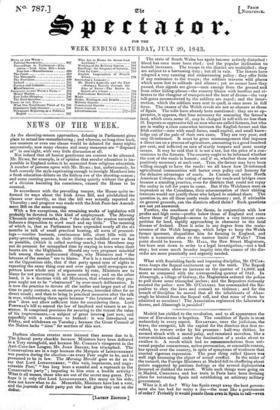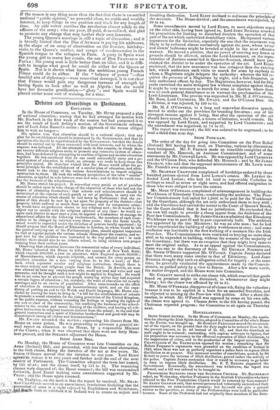Madrid has yielded to the revolution, and to all appearance
the cause of ESPARTERO is hopeless. The condition of Spain is most melancholy in every aspect. ESPARTERO, once the judicious, the brave, the energetic, left the capital for the districts that first re- volted, to restore order by his presence : half-way thither, he seemed struck with a moral palsy, and remained moveless, like a terror-stricken animal under the fascination of a snake about to swallow it. A revolt which had no recommendations from uni- versal popular concurrence, active provocation, or ostensible reason, has spread over the country, in spite of symptoms of weakness that courted vigorous repression. The poor thing called Queen was well nigh becoming the object of actual conflict. In the midst of the turmoil, the Foreign Ministers at Madrid fell to chaffering about points suggested by partisan feelings as the several diplomatists favoured or disliked the revolt. While such things were going on in Madrid, CHRISTINA and her train in Paris have been devising plans for rantering Spain and establishing an arbitrary military government.
What is it all for ? Why has Spain swept away the best govern- ment she has had for many a day—the most like a government of order? Probably it would puzzle them am in Spain to toll—eyea if the reason is any thing more than the fact that there is no settled national "public opinion," no powerful class, no stable and wealthy interest, to keep things in one position and track for any length of time. An able writer ascribes the revolution almost solely to the officers of the army ; who are poor, ill-paid, demoralized, and glad to promote any change that may further their own interests. The young Queen's marriage is still a topic of discussion ; and it is broadly hinted that the Duc d'AuasaLE is paying his addresses, in the shape of an army of observation on the frontier, birthday- visits to the Queen's mother, and scraps of condescension in the Spanish tongue to the refugees in Paris. A party in Spain want the young girl to marry her cousin, the son of Don FEANcisco DE PAULA: the young man is little better than an idiot, and it is diffi- cult to imagine what good he could do either for the Queen or Spain. Nor is it shown what harm the ambitious young French Prince could do to either. If the "balance of power "—that fanciful aim of diplomacy—were somewhat deranged, it is not clear that France would gain any dangerous increase of strength by having Spain to look after as well as Algeria : but she would have her favourite gratification—" glory "; and Spain would be placed under some sort of training, for a time.



























 Previous page
Previous page